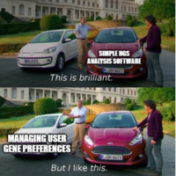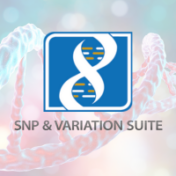We at Golden Helix are thrilled with our recent release of gnomAD v4! The curation of this massive database was a huge undertaking for our development team, but with the addition of new features, we believe it was well worth the wait. This annotation track contains allele frequencies from a more diverse population than ever before, with the addition of… Read more »
The Broad Institute’s release of gnomAD v4 needs no introduction as the data in this release is highly sought after by professionals in the genetics community, and the v4 release has a lot to boast about! The v4 release is roughly five times larger than the v2 and v3 releases combined and includes data from 807,162 total individuals. Naturally, exome… Read more »
Welcome to the exploration of groundbreaking genetic research in ophthalmology. Recent studies have unveiled fascinating insights into the complex interplay between genetics and eye disorders, offering hope and new directions for understanding and treating these conditions. From novel genetic variants linked to microphthalmia and glaucoma to the long-term implications of cataract surgery in childhood, we’re diving into the depths of… Read more »
We are excited to announce the release of our gnomAD v4 annotation tracks for VarSeq. This version of the GnomAD database represents a significant leap forward, including data from an impressive cohort of over 800,000 individuals — a remarkable 5x expansion compared to the previous releases. Notably, this dataset is comprised of two distinct callsets: exome sequencing data from 730,947… Read more »
Today, we will be exploring the indispensable role of GenomeBrowse in your VarSeq workflows. This blog aims to guide you through various customization options, including color preferences, filtering techniques, display modifications, numeric value plotting, and additional tips. I hope to enhance your GenomeBrowse experience and enable you to gain valuable insights into your data. Let’s jump in by talking about… Read more »
Many thanks to those who came to view our most recent webcast, From Panels to Genomes with VarSeq: The Complete Tertiary Platform for Short and Long-Read NGS Data. This was a great opportunity for us to showcase the breadth of our workflows, from short-read to long-read, panels to genomes, singleton analysis to families. In this blog, we would like to… Read more »
There are several contextual factors to consider when analyzing genomic data for NGS analyses. A variant may have divergent impacts depending on which transcript of the gene is being considered, or the impact of a variant could be weighed more or less heavily depending on the disease context. Evidently, the user’s gene preferences are very important, but not all software… Read more »
How long did it take to run coverage regions? Did my colleague update the filter chain like he said he would? Which import options did I use? Where did I save this project? These questions and more can be answered with our little-used VarSeq Log tab. Periodically, our customers come to us with questions in the realm of record keeping,… Read more »
In this blog, we explore the impactful applications of VarSeq in genetic research and diagnostics. Through case studies, we examine its role in diverse conditions like Immune Mediated Thrombocytopenia (ITP), glaucoma, and Cri du Chat syndrome. These studies demonstrate VarSeq’s capability in identifying genetic variants and influencing diagnosis and treatment across various medical scenarios, showcasing its crucial role in advancing… Read more »
Thank you to those who attended our recent webcast on Golden Helix’s SNP & Variation Suite (SVS) and its new capability related to Polygenic Risk Scores (PRS). If you were unable to attend, a recording can be found via this link. For common diseases, PRS can provide a predictive value related to the disease risk at an individual level. By… Read more »
VarSeq Warehouse is the solution provided by Golden Helix for management of large-scale genomic data. It serves a centralized, indexed variant repository that stores variants and assessments from selected samples or projects. Management of large-scale genomic data with VSWarehouse enables entire teams, including collaborators, to oversee key aspects of their NGS workflows. This includes allele frequency tracking across cohorts, cataloging,… Read more »
As many of you may already know, we just released VarSeq version 2.5.0 this month! We have talked about the two headlining features a bunch, but we have not focused on what else has changed in VarSeq 2.5.0 that might also strike your fancy. For those of you who might just now be tuning into the hype around 2.5.0, it… Read more »
It may come as a surprise to our long-standing users that the multi-allelic import and representation in VarSeq is slated to have different import options with the 2.5.0 upgrade. As the software grows and evolves, we strive to meet the changing needs of our users, and this is one area where an update was sorely needed. Before going into an… Read more »
Last month, the researchers at Google DeepMind announced the release of AlphaMissense, a new missense prediction algorithm that leverages the protein structure prediction model AlphaFold to distinguish between benign and pathogenic missense variants (Cheng et al., 2023). AlphaFold is a model for the prediction of protein structures from amino acid sequences. During the development of AlphaMissense, the AlphaFold model was… Read more »
Your variants of interest have been identified, the SVs annotated, and the CNVs classified. Once the manifest has been imported (and here is a great blog on the subject), the last step is to bring all of this information into a report template! In this blog, we will go over some simple report modifications and provide resources for more information… Read more »
…so we added some automation to your automation so you can automate while you automate! Automation has been a hot topic recently and for all the right reasons. As we (proudly) watch our customers increase their sample and data volume, we are constantly seeking to provide tools to reduce click rate and optimize throughput. Furthermore, with all of the new… Read more »
Variant interpretation is a critical aspect of any clinical NGS workflow. VarSeq assessment catalogs are a tool used to save variants and associated variant information for easy tracking and retrieval of completed variant interpretations. As variant interpretations stack up and classifications are saved, storing in assessment catalogs makes it easy to automatically fill in a previous interpretation if the variant… Read more »
Assessment catalogs are a way for VarSeq users to save variants and variant information for clinically relevant variants, so when you come across this variant again in another sample, all of the work to analyze and classify the variant is already done! But there is more than meets to the eye when it comes to using assessments in VarSeq. Being… Read more »
While the analysis of gene fusions is crucial for understanding the genetic basis of cancer, the process of interpreting these mutations can be challenging. One important component of fusion interpretation is the identification of relevant publications. To aid researchers in the search for publications related to specific gene fusions, Felix Mitelman and colleagues have created the Mitelman Database of Chromosome… Read more »
VarSeq 2.3.0 unleashed a whole new way to select, process, analyze, and report cancer variants through complete workflow automation, application of evaluation scripts, and enhanced annotation. Single nucleotide variants, copy number variants, structural variants, and genomic signatures could be added to a single patient evaluation, and Golden Helix CancerKB came packed with new report-ready interpretations to support them! Soon after,… Read more »
















